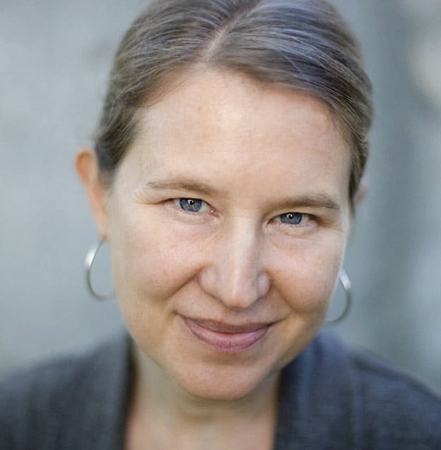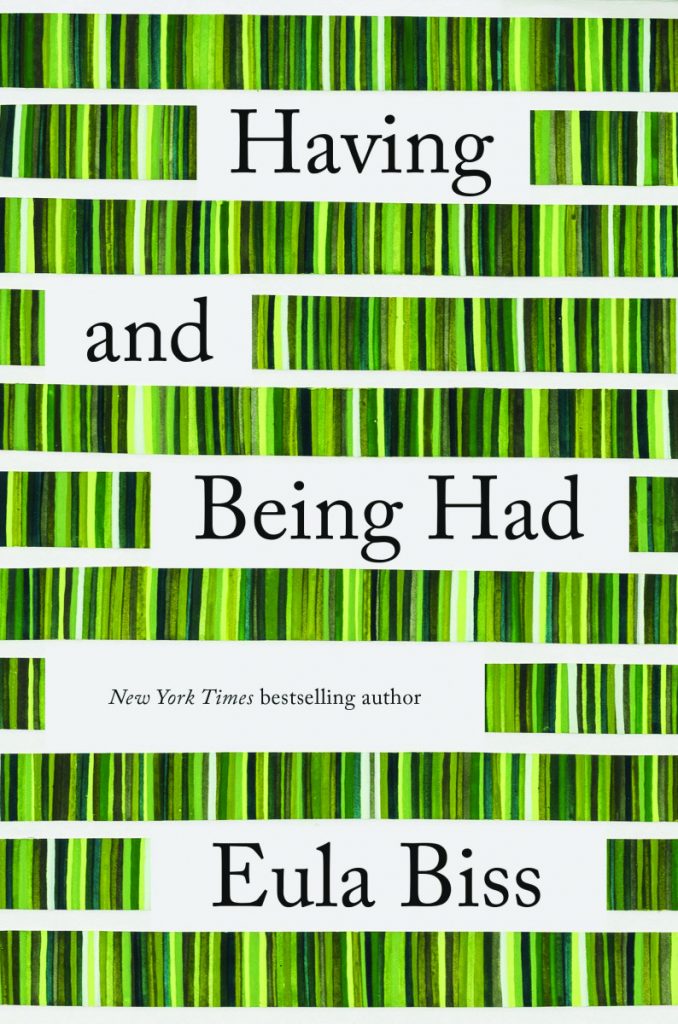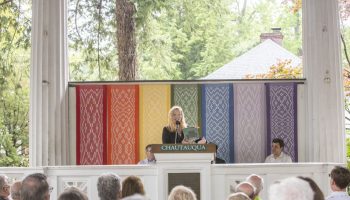SARAH VEST – STAFF WRITER

The winner of the 10th annual Chautauqua Prize is poet and essayist Eula Biss and her book Having and Being Had. Biss is the author of three other books, and her book On Immunity was named one of the Ten Best Books of 2014 by The New York Times Book Review. Notes from No Man’s Land won the National Book Critics Circle award for criticism in 2009. Her work has appeared in The Guardian, The Paris Review, Freeman’s, Believer Magazine and The New Yorker.
The Chautauqua Prize was conceived by Alice and Michael I. Rudell, and is funded by their contributions to the Institution. Michael I. Rudell passed away last January, but his legacy and love for literature lives on through The Chautauqua Prize and the newly endowed director of literary arts position.
According to Sony Ton-Aime, the Michael I. Rudell Director of Literary Arts, there were 218 books submitted by publishers and authors to The Chautauqua Prize this year. Each book was distributed to a group of Chautauquans who, over the course of a couple months, worked to sift through all the entries to create a long list for the prize’s committee members to choose from. There will be an awards ceremony at 1 p.m. EDT Thursday, Aug. 5 on the CHQ Assembly Video Platform.

The book is a nonfiction narrative work where Biss, having just purchased her first home, begins to reflect on and explore the value system she has bought into.
Biss endeavors to examine her assumptions about class, property, and the role capitalism plays in her life.
“In this book, she is doing something very radical,” Ton-Aime said. “You do not notice while reading it; her writing is so beautiful, and she is writing with so much tact that you cannot really feel this radical thing that she’s doing when it comes to the position of the individual in a capitalistic society.”
Ton-Aime calls the book timely, because we are at a moment when people are all questioning their position in the world as they reckon with climate change, steep economic inequality and the realization that everyone is implicated in these systems in some way.
He said he “could not be happier” that the Prize is being awarded during Week Six, themed “Building a Culture of Empathy.” To him, the book is asking people to be more empathetic, and to “be more aware of other people’s position and how they are affected.”
According to Biss, she got the inspiration for the winning book while she was working on her third book On Immunity, when she met a group of people who were anti-vaccine for anticapitalist reasons. Biss said that these people were suspicious of Big Pharma and thought that companies that were dedicated to profit could not have the best interests of their children in mind. Even though this was a brief moment in her book, Biss said that she remained interested in the psychological effects of capitalism, specifically people’s sense that they couldn’t trust other people’s motives because they only had profit in mind and that their ethics could be undermined by a financial motive.
“I came into this book with (the question), ‘What is our economic system doing to the way we think about our everyday lives, the way we think about other people (and) the way we think about little interactions with other people?’ ” Biss said.
Biss references a moment in the book where she is observing her son playing the Pokémon trading card game with other children. Biss said that she was essentially watching him learn the tenets of capitalism, specifically the idea that one shouldn’t give something away without getting something of equal or greater value in return. Watching her son learn this lesson the hard way prompted her to wonder, “How do we learn this way of thinking — and can we unlearn it?”
She wanted this book to be grounded in the concrete, partially because so much literature about economics is abstract and does not focus on the people who drive the economy. She compares it to learning about physics in outer space; it is treated as distant from the human aspect.
“It currently is a way of reminding myself and my readers that this is a system made by people, for people,” Biss said, “and if we don’t like it, we should change it.”
Biss describes winning the Prize as “a terrific surprise and really, really gratifying.” She said it is encouraging to have her work recognized, and that the Prize money —$7,500 — will buy her more time to write. She will be teaching an in-person two-day writing workshop during Week Nine that is associated with the Prize, and she is excited to teach on the grounds and learn about the rich history of Chautauqua.
“All of my teaching has been online,” Biss said. “I’m so looking forward to being in the same place with some real-live, in-the-flesh students.”
This year the physical prize itself was designed by Danielle O’Malley, a sculptor in the Chautauqua Visual Arts ceramics department who uses clay as her primary medium. She said that she is “very excited and also very honored” to have been asked to create this year’s prize.
O’Malley said her work deals a lot with environmental care and the idea that capitalism leads to environmental degradation, which ties into the themes of Biss’ book. She describes the prize, which will be unveiled at the ceremony today, as an abstracted structural house that is made of woven parts that delicately attach together.
“The aesthetic that I use, I leave my fingerprints in the clay,” O’Malley said. “There’s a roughness to the surface of the clay, as well as the spotty application of the glaze work. Clay is an earthen material, and by putting like leaving my fingerprint in there, it’s like a record of the impact that humanity leaves on the environment that can be positive or negative.”




